Mysteries of Operation Overlord
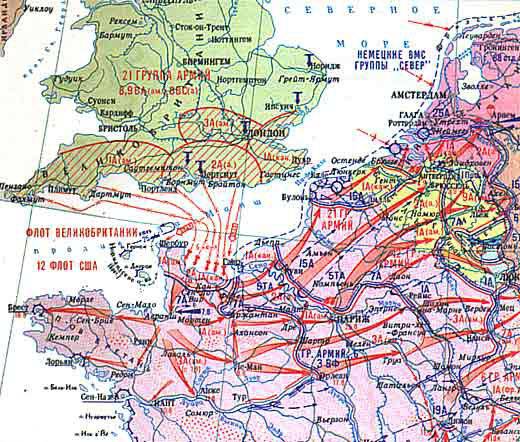
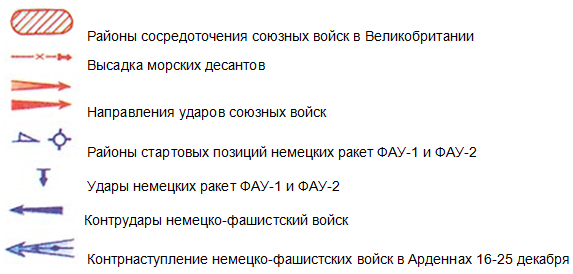
It would seem, story World War II explored far and wide. Multi-volume monographs have been issued, thousands of dissertations have been defended. And yet, all the same ... There are still "white spots", and other events appear in a completely different light - it is worthwhile to approach them not in the traditional way, but in the way our authors did.
Strange coincidence day
6 June 1944 of the year - the day "D", the day, according to England, who decided the fate of Europe, the day of strange coincidences and unsolved mysteries.
So, the operation "Overlord" - the landing of the Allied troops in Normandy - due to the terrible weather becomes almost impossible, every hour of delay increases the risk of information leaks and the detection of the landing by the fascists. Eisenhower, who commanded the Allied forces, unexpectedly for many ventured to start a virtually hopeless operation ... I did not make a reservation: the operation that the whole world had been waiting for, which began almost five years after England declared war on Germany and three years after the attack of the fascists on the USSR, the normal course of events should have been doomed to failure.
It is not by chance that before starting the operation, Eisenhower left an envelope with a statement that he takes all the responsibility for a possible failure.
Well, first of all, isn't it a miracle that the Allies managed to hide the accumulation of seven thousand ships and a huge army of paratroopers for a long time, although the Germans were within reach of England?
In the evening of 5 June 1944, the commander-in-chief of Hitler's troops in the West, Field Marshal Rundstedt, received a report that the BBC radio station in London was transmitting unusually many coded messages for the French Resistance and that German radars (Radar stations) between Cherbourg and Gavre delivered strong resistance numbers. In 22 hours, the BBC's coded message was intercepted by the BBC to the French Resistance, which meant that the invasion was beginning, but the commander-in-chief, responsible for the defense of the Reich’s western frontiers, did not react to this. Although it was possible, if not to deliver a preemptive strike, then at least prepare for a reflection.
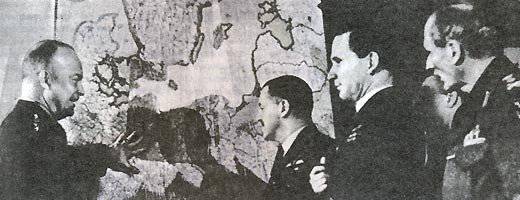
Further. During the convoy, storms raged all the time, but when the ships approached Normandy, the wind, as ordered, fell. But this miracle was not enough for success.
German radar stationed an armada of ships moving to the shores of Normandy. However, Rundstedt did not believe the message, saying that the sailors saw a flock of gulls on their radar screens.
It would seem that what is simpler is to send a plane or a ship to the area and check the alarm signal, especially since it was about the fate of Germany. But the incomprehensible is happening - no one gets such a task either from the commander in chief or from any of the senior officials. At the same time, Rundstedt alerted the 15 Army in the Pas-de-Calais area, but did not consider it necessary to issue the same order of the 7 Army, which was located in the coastal sector between Caen and Cherbourg. reportedly, thousands of ships are sent to the Allied forces. Strange logic, is not it?
Surprisingly, the day before, the commander of the 7 Army, General Friedrich Dolman, in coordination with Rundstedt, gave an order to temporarily cancel combat readiness and assembled his senior officers to conduct staff exercises in Rennes, which is approximately 125 miles from the Normandy coast of the English Channel. (Then W. Churchill will note in his memoirs that, apparently, stunned Germans fired indiscriminately in response, however, the reason was that there was no one to control them).
At midnight, three airborne divisions began to land; one in the north-east of Cana in order to capture bridgeheads on the river between the city and the sea and two north of Quarantan to help the amphibious assault forces and prevent the enemy from transferring reserves to the Cotentin peninsula.
Major General Pemzel reported over the phone that, apparently, a large-scale operation had begun, but Rundstedt was skeptical about the report, considering it a distraction, and did nothing to assist the 7 Army.
The Allies had only half an hour between ebb and flow when it was possible to destroy the underwater obstacles at a depth of two feet, and they somehow managed to do it. But, as it turned out later, all these miracles were also too few for the success of the operation ...
When at dawn on June 6 Rundstedt began to receive reports of the landing of large allied forces in Normandy under the cover of the deadly fire of large-caliber guns of the armada of warships, the commander-in-chief again did not believe that the Allies had undertaken the main assault and did not take the necessary countermeasures, although in the area adjacent to the landing site were two tank division.
Rundstedt had enough forces to protect the coast - from Holland and Belgium to the Bay of Biscay - 60 divisions; but 10 armored divisions, designed to reflect the landing of the assault, were scattered from Belgium to Bordeaux. Strange, but Rundstedt made the same mistake as the French in 1940, for which he then roughly punished them, but more on that later.
For 24 hours on June 6 aviation Allies made more than 14 sorties.
Another inexplicable event occurs: the person who could thwart the plans of the allies - General Rommel, it is at this time that he is not in his headquarters, but hundreds of kilometers away ... And strangely - the fearless Rommel does not dare to break the ban of the Fuhrer and only by the end of the day gets to his troops, but time is lost ... However, this is not all.
Only when the Allied troops landed, although they could not accomplish the primary task of taking Kahn, but “chop off” the territory from two to six miles in depth and thoroughly entrenched, Rundstedt began to call Hitler to the headquarters.
And in addition to everything Hitler is sleeping! He sleeps, and the most experienced military leaders, Keitel and Yodl, who could not fail to understand the seriousness of the situation and the dangers of delay, nevertheless did not decide either to order the counterattack to the tank units located near the landing site, nor to wake the Fuhrer. When the Fuhrer awoke, it was already too late and it was not possible to meet the landing forces with a tank strike. The fully advertised Atlantic Wall was broken in a few hours ... Incredibly, but Hitler literally oversaw the Allied landing.
Something strange is happening at sea, as W. Churchill casually remarks in the third volume of his book “The Second World War”: only a small part of German submarines located in the Bay of Biscay receives orders to attack the Allied landing ships, and even if they agree , they are sent to the combat area ... on the surface, representing an excellent target for shooting training and precision bombing of allied ships and aircraft.
It is unlikely that experienced submariners voluntarily went on such a frank adventure, since winning a few hours did not play any role: such landings are not a matter of a single day, therefore, someone gave this ridiculous and murderous order, with the result that the submarine fleet who was assigned the duty to protect the coast from the Allied troops, could not fulfill the task assigned to him.
So, the conclusion is: too many strange coincidences!
The project was awesome
The plan of Operation Overlord was developed by the Kossak group (Abbreviation of words: Chief of Staff Supreme Alied Comander) under the command of Lieutenant-General F. E. Morgana, who studied the sad experience of landing in Europe 19 August 1942 of the year in Dieppe region (operation “ Anniversary ") ended in disaster for many reasons.
England at that time did not have sufficient resources to conduct a large-scale operation, and German submarines hosted on the sea, drowning convoys of allies in the icy waves of the northern seas and off the coast of America. The famous phrase, scratched with a goose feather of an unknown chronicler - “Rule, Britain, by the seas”, caused explosions of laughter from German submariners.
So, around 250 ships under the cover of 800 airplanes - that was almost all that the British could use at that moment. Moreover, one of the landing squads was discovered by the Germans on the way, and the element of surprise was lost.
Marines could only use light rifle weapons - unloading heavy weapons (tanks, artillery) and ammunition on the open coast under enemy fire proved an impossible task.
Soviet historiography regards Operation Jubilee as an attempt by the Allied leadership to prove: it is impossible to open a second front in Western Europe due to a lack of manpower and resources; However, one should not forget about his own sad experience - the landing of Soviet troops in the area of South Ozerieka 4 in February 1943 of the year, which confirmed the considerable difficulties and unforeseen dangers of such operations.
For one broken two unbeaten give - the allies were able to draw the right conclusions: the landing of a large landing - this is not so much a military, as organizational and engineering problems.
W. Churchill recalled:
“... It was necessary to take into account the influence of tides. If we landed at the highest level of the tide, the approach to the shore would be hampered by underwater obstacles. If the landing was done at the lowest level of low tide, then the troops would have to walk a long distance along the coast open for shelling.
The difference in water levels at high tide and low tide in the English Channel is more than 20 feet, and the corresponding scourways remain on the shore ...
... The project was awesome. It was necessary to build at least two floating harbor "Mulberry". At the landing points, build large moles. That part of these moles, which goes into the sea, was supposed to be floating and protected for unloading ships. To protect them from storm winds and waves, it was necessary to install a large arc facing the sea, breakwaters consisting of sunk concrete blocks "Phoenix" and blocking vessels "Guzberry"
One of the main reasons for the success of Operation Overlord is the mistake of the fascist command in determining the area of the intended landing.
Brittany, Normandy, Pas-de-Calais - the choice was not too big. First of all: when landing in Brittany, the allies found themselves on the outskirts of Europe and did not create an immediate threat of strategic importance - economically and politically - to the centers, and in particular to Paris, which clearly reduced the effectiveness of the operation. In addition, Brittany is the most remote from England and, therefore, there were many dangerous inconveniences, in particular, made the convoy ships more vulnerable to German submarines located in the Bay of Biscay and Brest.
It remains the Pas-de-Calais and Normandy.
The advantages of landing at Pas-de-Calais were in the smallest distance, but the difference was not so great, so this condition could not be decisive.
Otherwise, everything pointed to Normandy:
- the main thing: there were no such defensive structures as in Pas-de-Calais (they were many times weaker and built only on 18 percent). Although all the 50 miles of the sandy beach between Le Havre and Cherbourg were protected by concrete fortifications and concrete pillboxes, the defense did not have the necessary depth to ensure its stability and resilience;
- The Germans did not concentrate large forces here to directly protect the coast;
- The coast is better protected from storm winds, which encased and accelerated the landing of troops;
- the landing site is more distant from Germany and. hence, from the fighter aircraft of the Luftwaffe;
- the terrain favored the rapid deployment of forces and was sufficiently removed from the main enemy forces;
- there were ports that could be isolated and captured at the very beginning of the operation, which would sharply accelerate the transfer of troops and the build-up of forces in the bridgehead;
- in comparison with Brittany, the landing site was quite remote from the Bay of Biscay and Brest, and the Germans could not have time to use submarines against the landing force in a massive manner;
- from the landing site, the road to Paris was much shorter, and therefore, with the successful development of events, the Allies could quickly capture it, which should have accelerated the collapse of the Third Reich.
The methodical, devastating three-month bombing of railways and bridges in Normandy, which cut off the coast from the places of deployment of the Wehrmacht troops, also clearly indicated the intended landing site. Moreover, the intensity of the bombing and the enormous losses incurred by the Allied aircraft would have been an unaffordable luxury, if it were distracting operations.
At the end of March, Hitler, who by the way studied Clausewitz and Moltke, who had read all Schlieffen's works, came to the conclusion that Normandy would be the main invasion area. “Keep an eye on the Normandy,” he constantly warned the generals and ordered, within the next few weeks, to transfer significant reinforcement funds to the area between the Seine and the Loire. However, usually the disciplined Rundstedt and its generals concentrated the main backbone of the German forces north of the Seine between Havre and Dunkirk, that is, they followed the Pas-de-Calais rather than Normandy.
66 thousands of tons of bombs dropped by the Allies for three months on railway communications at 93’s most important centers on the Normandy approaches created a “desert of wilderness” around the German forces in the landing area, but Rundstedt continued to monitor Pas de Calais and insisted that the weight of the bombings the Allies spend to avert the eyes and their main goal is the Pas de Calais.
Rundstedt hesitates
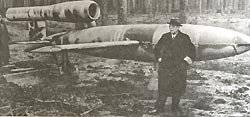 17 June, at the insistence of Rundstedt, a meeting was held in Marzhival, but Rundstedt and Rommel failed to convince Hitler to withdraw troops deep into the continent. And after the field marshals left, a strange event occurred: Vau-1, who had gone astray from London, fell on a bunker, but the Fuhrer was not injured.
17 June, at the insistence of Rundstedt, a meeting was held in Marzhival, but Rundstedt and Rommel failed to convince Hitler to withdraw troops deep into the continent. And after the field marshals left, a strange event occurred: Vau-1, who had gone astray from London, fell on a bunker, but the Fuhrer was not injured.29 June Rundstedt and Rommel appealed to Hitler with a proposal to realistically assess the situation and put an end to the war, but it later turned out that Rommel was involved in a plot against Hitler ...
There were reserves in the 15 Army, but only after 6 weeks did Rundstedt allocate them to help the 7 Army. However, time will be lost.
30 Jun Keitel, trying to figure out the situation, asked: “What are we going to do?”, Followed by Rundstedt’s extravagant response: “To make peace, you fool! What else can you do ?! ”
The next day, Rundstedt was replaced by Field Marshal von Kluge.
But here is another surprising circumstance: until the twentieth of July, the Allies did not take active steps. As it turned out, Washington and London were waiting for news from Berlin ...
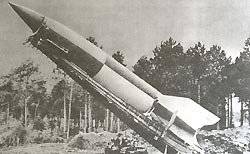 17 July 1944, the Allied aircraft attacked the headquarters, and the idol of the German masses, the most popular of all military leaders, famous field marshal Rommel was seriously injured.
17 July 1944, the Allied aircraft attacked the headquarters, and the idol of the German masses, the most popular of all military leaders, famous field marshal Rommel was seriously injured.20 July 1944 at Hitler’s headquarters exploded with a powerful bomb planted by Colonel Staufenberg, but the Fuhrer was only shell-shocked.
“This pathological liar,” exclaimed Rommel, when he mentioned Hitler in an interview with Spedel, completely lost his mind. He will bring sadism to the participants of the July 20 conspiracy, and that’s not the end. ”
Rommel guessed: on the operating table in Verdun, the blinded General von Stülpnagel accidentally called his name, and later Colonel von Hofacker, unable to withstand the terrible tortures in the dungeons of the Gestapo on Prince-Albrechtshtrasse, spoke about the role of Rommel in the plot and his words: that they can rely on me. ”
This phrase sat down in Hitler's mind, and, by his order, the general who walked in his favorites, wearing his leather jacket - the shape of the African corps and squeezing the field-marshal's baton, 8 of August took poison.
Field Marshal Model issued an order for the troops, which noted that Rommel died from wounds received on July 17 and expressed grief over the loss of "one of the greatest generals of the nation."
Rundstedt, as a representative of the Führer at a state funeral, delivered a speech: "His heart belonged to the Führer." However, he ... refused to attend the cremation and come to Rommel's house to express his condolences to the widow, as most generals did.
The unexpected happens: Rundstedt voluntarily takes the post of chairman of the court of honor established by Hitler to expel from the army all the officers suspected of involvement in the conspiracy against him. The strangeness of Rundstedt’s deed was that the court of honor was not allowed to hear the testimony of the accused officers in his defense, and the verdict was made on the basis of evidence provided by the Gestapo and the officers dishonored and expelled from the army, already as civilians, were handed over to the notorious People’s Court (The President of the People’s Court was Ronald Freisler, an evil maniac who, being in the first world understanding in Russian captivity, became a fanatical Bolshevik, and after 1924 of the year he was a fanatical Nazi.) ski sent them to the paws of the executioners.
Surprisingly, the famous military leader and aristocrat Rundstedt, at least to comply with propriety, did not try to protest against such a restriction of the rights of the accused, his comrades in arms.
The prim aristocratic officer corps, forgetting about its traditions, obediently observed how, but according to the order of the former corporal of the Austrian army, dozens of top generals were thrown into the Gestapo dungeons and sent to the slaughter after the judicial farces played out in the People’s Court.
Three renowned field marshals - Winzleben, Kluge, Rommel - left the stage: one was hanged, two were forced to suicide, 4 September 1944, Rundstedt was reinstated as commander-in-chief in the West, but later he would say strange words to the Allies after interrogation: “For me the war ended in September. ”
Jeopardy
Let's get accustomed to the man who “missed” the largest landing operation of the Second World War.
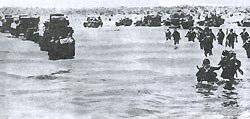 Rundstedt was an intelligent general, and his military art cost dearly to our country: under his command, soldiers of Army Group "South" took Kiev and 665 thousands of prisoners, and then immediately broke through the legendary Perekop and captured the Crimea, in which our troops were no less Considering that for a successful defense to break through, the attackers must have a significant advantage in strength (an approximate ratio of 3: 1), this fact speaks for itself.
Rundstedt was an intelligent general, and his military art cost dearly to our country: under his command, soldiers of Army Group "South" took Kiev and 665 thousands of prisoners, and then immediately broke through the legendary Perekop and captured the Crimea, in which our troops were no less Considering that for a successful defense to break through, the attackers must have a significant advantage in strength (an approximate ratio of 3: 1), this fact speaks for itself.By the way, when Hitler gave the order to take and keep Rostov - the “gateway of the Caucasus”, Rundstedt took Rostov, but realizing that he could not keep him, he telegraphed to Hitler: “Trying to hold positions is insane ... order must be canceled or someone will have to find another to my place. ”(Agree, not everyone could decide to call Hitler’s order“ insanity ”and talk to him in that tone.)
The Fuhrer did not hesitate to reply: “I agree with your request. Please hand over the command. ”But this was not the first resignation of a field marshal.
Rundstedt, still in 1938, showed himself to be an oppositionist and "deserved" his resignation. However, when Hitler needed skilled commanders, Rundstedt was again in the ranks.
A daring massive strike by armored forces through the 10 Ardennes in May 1940, commanded by Rundstedt, led to a breakthrough of the enemy’s defense, and seven tank divisions, breaking through the Meuse, rushed to the English Channel. This, in turn, led to the capture of France. Rundstedt was promoted to field marshal general.
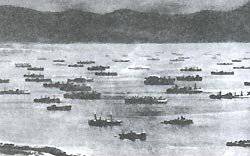 The main lesson of history, as they say, is that it is not taught. Rundstedt brilliantly conducted breakthroughs in the Ardennes twice during the same war, both times putting the Allied armies on the brink of destruction, and, amazingly, both times the miracle rescued the Allies: the first was the “Dunkerque miracle” and the second I would call the “Ardennes miracle” .
The main lesson of history, as they say, is that it is not taught. Rundstedt brilliantly conducted breakthroughs in the Ardennes twice during the same war, both times putting the Allied armies on the brink of destruction, and, amazingly, both times the miracle rescued the Allies: the first was the “Dunkerque miracle” and the second I would call the “Ardennes miracle” .In the first case, the Allied troops, pressed against the sea, defeated and demoralized, faced a dilemma: to capitulate or to be literally crushed by a steel avalanche of German tanks.
However, the 24 of May 1940, when the German tanks were preparing to deliver the final blow to Dunkirk, was received a strange, simply inexplicable order - to stop further offensive. The tanks were stopped, but not by the strength and courage of the Allied soldiers, but by the order of Rundstedt, which, as established on the basis of the archives of Rundstedt's headquarters, personally convinced Hitler to stop the tanks in front of Dunkirk until infantry divisions were tightened. And the tanks stood on the spot exactly as long as it took to accomplish the “Dunkirk miracle” - the evacuation of the 338 of thousands of almost unarmed Allied soldiers ...
After four and a half years, the turn of the “Ardennes miracle” came.
For a breakthrough in the Ardennes, almost 28 divisions were formed, including 9 tank divisions and, in addition, 6 divisions for a subsequent strike on Alsace. Otto Skorzeny, the Führer's favorite, was entrusted with the operation “Graf” (“Condor”), according to which about two thousand German soldiers who knew English were dressed in American uniform, equipped with captured weapons and thrown into the rear of the allies for terror, disorganization and seizure bridges.
Having taken the Allied command by surprise, on the morning of 16 December 1944, Rundstedt’s troops broke through the defenses, and on the night of December 17 the German tank group approached Stavelot, just 8 miles from Spa, where the 1 US Army headquarters were located. German tanks stop, it's hard to believe, just ... one mile from the vast American gas storage facility, where three million gallons of gasoline was concentrated. Capture the Germans this warehouse, their armored divisions, suffering from a shortage of fuel, could quickly move on, but the "Ardennes miracle" happened - the warehouse was not captured.
28 December 1944 of the year Rundstedt suggested Hitler to withdraw troops ...
January 1 1945 of the year German aviation delivered an unexpected and terrible blow to the allied airfields, but it was too late; The “Ardennes miracle” happened, and it cost the Germans dearly. They lost 120 thousands of soldiers, 600 tanks and self-propelled guns, 1600 aircraft, 6 thousands of vehicles.
And the question arises involuntarily: why was this air strike timed not to the beginning, but to the end of the operation?
Knowing all these facts, you doubt that such an experienced military leader could be so blatantly wrong with the time of the commissioning of aircraft, and in determining the landing site. After all, former corporal Adolf Hitler, who did not possess such experience and knowledge, could guess the place of the Allied landing party!
Rundstedt was not a “parquet” general, and there were no fools among combat officers who had served as field marshal's baton.
If we compare all the facts of his uncommon military career, combined with "miracles", his undisguised opposition to Hitler, the strange resignation during the crackdown on the conspirators, the thought involuntarily comes that Rundstedt did not miss the landing in Normandy. And although there is no documentary evidence of his participation in the conspiracy, he still, in my opinion, had something to do with him.
Rundstedt was known for Hitler’s misanthropic plans, and he understood how they threatened the world. And in the 1940 year under Dunkirk, he, soberly assessing the consequences of the destruction of Allied troops, could come to the conclusion that this could have a fatal effect on the fate of England, and hence of all of Europe. The subsequent battle for England showed how “Foggy Albion” was close to a catastrophe and how experienced soldiers and officers who escaped as a result of the “Dunkirk miracle” were useful.
In 1944, the most stupid general already understood that the war was approaching an inevitable denouement, and the question was only in time. Each day stolen from the war saved tens of thousands of lives, and therefore the success of the Allied troops landing ultimately reduced the flow of "funerals", and the failure could prolong the agony of the Nazis and increase the already monstrous list of victims by several million. The defeat of the Allies in the Ardennes in December 1944 could lead to the same tragic consequences.
And Rundstedt could not help but understand ...
And one more indirect confirmation: many people who are interested in the history of the Second World War, from Operation Ultra, a book by F. Winterboth, know that, thanks to the intelligence system created by the British, which used the revealed secret of the German Enhim cryptographic machine (from the Greek Riddle), The allies practically deciphered the radiograms that the German generals exchanged throughout the war, and therefore were always aware of all the enemy’s intentions (including Rundstedt) during Operation Overlord.
“Ultra” snapped only once - a counter-strike in the Ardennes for the allies was a complete surprise. And again a strange coincidence: when Rundstedt’s fate hung in the balance (in the event of an unsuccessful start of the operation, he would probably also be counted among the conspirators), he forbids using radio communications, and all orders are delivered to the units by liaison officers. The question arises: did he know or only guessed about the "Ultra"?
From the investigation materials it is known that the conspirators appealed to almost all the highest and most respected military leaders in the army, and first of all to those who were considered offended by the Fuhrer or who disagreed with his policies. And it is unlikely they avoided Rundstedt, and then his behavior during the crackdown on the conspirators becomes clear - he was afraid to betray himself.
What is it - his personal secret war with Nazism, which he waged according to his own understanding, fulfilling his duty to the German soldiers? Or did he give chances to the allies to defeat Nazism? And even after the end of the war, he could not admit it: some would simply not understand him, while others - Nazi fanatics - would deal with him.
But these are just guesses and versions ...
Karl Rudolf von Gerd Rundstedt ended his life in 1953, in Hanover, in the Federal Republic of Germany.
Words that nobody uttered
Place: the west coast of occupied France.
Date: 5 June 1944 of the year.
Case: On the eve of the historic “D-Day”, a radio message about the landing of allies in Europe suddenly sounded on the air. The British counterintelligence was astonished, and the Germans were confused, because they could not attribute all that had happened to the exploits of their spies. Officially, the announcement was considered to be a blunder by the employees of the BBC radio station, but so far no new facts have emerged that could explain the origin of the message.
Interested parties: German Center Group and British intelligence MI-5.
General von Sapmut calmly played the game of bridge when Colonel Meyer hurriedly entered the hall to announce the incredible news: The BBC reported an Allied offensive through the French phrase: "Blessent mon coeur d'une langeur monotone." ("My heart consumes languor.")
It is not known how the people from the Abwehr, Wehrmacht counterintelligence, managed to decipher the message hidden behind the line from the verse called “Autumn Song”, but the commander of the 15 army brought everything to the attention of his superiors as soon as he could. In 10.05, all the army commanders and commanders of the German army were aware of the radio message, but Shpidel, Jodl, Keitel, Blumentritt and Von Rundstedt did not react to the news. Weather conditions and sea conditions were considered unfavorable for the landing of the landing force, and, moreover, it was inconceivable to imagine that the British intelligence service could send a similar message through ordinary London radio. One of the generals of the General Staff muttered: “General Eisenhower would not trust the BBC to announce the landing of troops!”
Nevertheless, the message was correct. The Allies launched an electronic attack. German radar stations located in Cherbourg and Le Havre were “blinded” by noise and various random radio signals that paralyzed almost all the equipment. Only the fekam and kale radar continued to function. In 23.30, the strategic points of the French coast were subjected to a lengthy air attack, and in 00.15 the first paratroopers touched the ground. The Abwehr no longer had time to find out the circumstances of the transfer. However, MI-5, its English equivalent, as it should be, seriously took up this issue ...
Eisenhower, who commanded the invading forces, was inclined to believe that fate was clearly going against him. All the invasion plans that constituted the main military secret seemed to seek to become known to the enemy. Two officers were demoted for excessive talkativeness. Another non-commissioned officer confused the envelopes and passed all the information to his sister in the United States. Another twelve secret documents flew out of the window, flushed with a gust of wind, and although eleven of them immediately picked up, the secretaries did not find a place for themselves until an unknown person brought the last circular, which was considered to be lost forever. And to top it all, the keywords for the landing were appeared in the May Crossword of the Daily Telegraph, and the possibility of espionage in this case was practically excluded. (It was about the word "Overlord", which figured in the questions composed by the ordinary school teacher Mr. Dow.)
And after all this, Eisenhower finds out that at night London Radio announced to the whole world about the beginning of an Allied invasion of France. Although the message was encrypted, the Germans could have known - and this turned out to be true - a system of codes. MI-5 immediately began to investigate the incident, which, no matter how you look, clearly looked like someone's betrayal ... But then it turned out the most surprising.
The agents were urgently sent to the “Associated Press”, where there should have been a person who had recounted the key words from the “Autumn Song” to someone on the “London Radio” who read them. However, the author did not find the slips. Employees of the radio station itself were also interrogated and interrogated. And with the same result: it turned out that no one ever uttered this phrase in front of the microphone!
Could we speak about a piece of a broadcast from another radio station, which “prolezshey” accidentally in the release of BBC? The counterintelligence service categorically asserted that the technical characteristics of the message did not show external interference. The alleged traitor was supposed to work at the Associated Press or at the radio station itself. But to blame all employees for treason or concealment was a complete absurdity. All attempts of MI-5 to get to the bottom of the truth in this matter ended in nothing. The war, meanwhile, continued, and soon the whole story lost any significance - after all, the very next day the attack began on the Atlantic Wall, the German defense system on the coast. The investigation was stopped, delivering a verdict that everything "was the fruit of the secretary's imagination."
After the war, the multi-ton stops of secret documents were thoroughly studied. Among the Abwehr there were no materials confirming the responsibility for what happened to any group of spies or sympathizers with the Germans in Great Britain. The strangest thing is that this message, despite all expectations, helped the allies. Except for von Salmut's troops, the rest of the army remained - also for unknown reasons - passive, the Historian Paul Carell wrote about this: "Here we meet with a psychological failure, the true meaning of which cannot be deciphered."
Verlaine's Message, as it was called, contains many unknowns, although in classic history books it is considered an incredible anecdote: how could it happen that all station workers deny what happened? Who said the line from the song in front of the microphone? It is very difficult to answer these questions, if you don’t remember that shortly before the two warring parties received other strange messages, the source of which remained unclear. Perhaps the Germans carried this last message to the same type and therefore did not respond in any way?
It would probably be more correct to address the so-called “transcommunication phenomenon” to solve this riddle. These are signals from an unidentified source that researchers Francois Brun and Sinesio Darnell attribute to disembodied human beings. Whatever it was, the father of modern psychophony, Friedrich Jürgenson, in 1959, began to catch with relative frequency such messages, which, in contrast to the most popular method of radio piracy, appeared on "empty" radio waves.
But the riddle of the “message of Verlaine” is not only in this, because the landing was preceded by several rather rare phenomena. Sheets describing an aviation attack, which were blown away by the wind, are reminiscent of the famous joke about the astronomer Camille Flammarion - he had a gust of wind scattering work on anemography (the science of wind direction and strength). And what about Mr. Doe's crossword? Was the message another “rare occurrence” related to what we now call transcommunication?
Today we define the phenomenon of psychophony as sounds reasonably formed from random noises. But then, in the case of "Verlaine's message," there was a need to create "electronic noise" in order to "blind" the radars of the Germans. According to chaos theory, chaotic systems, such as these classes of sounds, can be organized to achieve a very specific result, and thus, “Verlaine’s message” can be considered a direct intervention of paranormal forces throughout history, because it was this intervention that became a peculiar milestone of the Second World War ...
Information